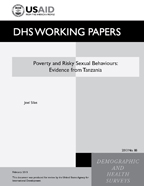- PUBLICATIONS
- JOURNAL ARTICLES
- ACCESS PUBLICATIONS
Publications Summary
- Document Type
- Working Papers
- Publication Topic(s)
- HIV/AIDS, Wealth/Socioeconomics
- Country(s)
- Tanzania
- Language
- English
- Recommended Citation
- Silas, Joel. 2013. Poverty and Risky Sexual Behaviors: Evidence from Tanzania. DHS Working Papers No. 88. Calverton, Maryland, USA: ICF International.
- Download Citation
- RIS format / Text format / Endnote format
- Publication Date
- February 2013
- Publication ID
- WP88
Download
 Poverty and Risky Sexual Behaviours: Evidence from Tanzania (PDF, 543K)
Poverty and Risky Sexual Behaviours: Evidence from Tanzania (PDF, 543K)
